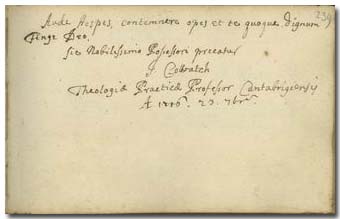
Aude Hospes, contemnere opes et te quoque dignum finge Deo. *
Sic Nobilissimo Possessori precatur
J. Colbatch
Theologiae Practicae Professor Cantabrigiensis
A. 1716. 23. 7bris
|
* Virgil,
Aeneis 8.364-5. We quote it in the English translation by
Theodore C. Williams.
|
|
|
Dare, O illustrious guest / to scorn the pomp of power. Shape thy
soul / to be a god's fit follower. *
This I wish to the noble owner [of this album]
J. Colbatch
professor of practical theology in Cambridge
on September 23, 1716.
|
p.
239. Cambridge, October 4, 1716
Colbatch, John
(1664-1748), English theologian
John
Colbatch was born in 1664. He studied at Westminster School in London between 1680 and 1683, and then he was admitted to Trinity College
in Cambridge. He became fellow of the College; in
1690 he graduated M.A., and in 1706 Doctor of Divinities. At the
beginning of hist pastoral carreer he spent seven years in Lisbon
as chaplain of the British factory. From 1701 for two years he was
tutor of the son of Duke of
Sommerset, Chancellor of the University of Cambridge, and for two more years he accompanied him to travels;
then he was dismissed. At the age of forty he returned
disillusioned to his university, where he became professor of
casuistic theology. His lectures of moral philosophy were
renowned. In the feud between the fellows and the master of Trinity College first he wrote a pamphlet in defence of the
master, Richard Bentley, but in 1714 he refused the master's
invitation to become his assistant, so they came into conflict
with each other. Colbatch enjoyed a canon's stall of Salisbury
between 1702 and 1720. Besides university lectures he also
accepted the pastor's office in the nearby Orwell of
Cambridgeshire, and he kept it until his death. He died on
February 11, 1748. The British standard biography [DNBC] laconically
characterizes him as "opponent of Bentley". Richard Bentley
(1662-1742) was an eminent philosopher and critic, editor of a
series of classical authors. He was in correspondence with Newton
about the new discoveries of this latter and the impact of these on
religious faith. Between 1700 and 1742 he was master of Trinity
College, and for a while archdeacon of Ely. He tyrannically
reduced the rights of the college fellows, who turned to the
Bishop of Ely. The protracted litigation ruined for years the life
of the college and of the university. In 1714 even Newton was
invited to appear in it as an expert, as he had renounced his
position because of his removal to London. – Works of John Colbatch: Account of the state of
religion and literature in Portugal. – An account of the
court of Portugal under the reign of the present king Dom Pedro II
: with some discourses on the interests of Portugal. London, 1700.
Colbatch signed his dedication written in the
album in 1716 as professor of practical theology. A day later also
John Covell (p. 476), master of Christ’s Church College
wrote in the album, but Richard Bentley is missing. Apparently a
principal question of the academic life in Cambridge and perhaps
also elsewhere was to take a position either against or on the
side of Bentley. András Ajtai Szabó (p. 451)
wrote on March 6, 1716 to Covell from London that here he met
Bentley and told him about the case of the College of Nagyenyed
(Aiud). So when Ferenc Pápai Páriz travelled to Cambridge in
September of the same year, he had to choose whether to contact
Bentley or his opponent, Colbatch [Gömöri: Adalékok]. – Our
theologian Colbatch is not to be confounded with the physician Sir
John Colbatch (?-1729), author of a number of works on medicine.
• DNB •
Jöcher-Adelung • Newton-Fehér • Newton-Heinrich |

